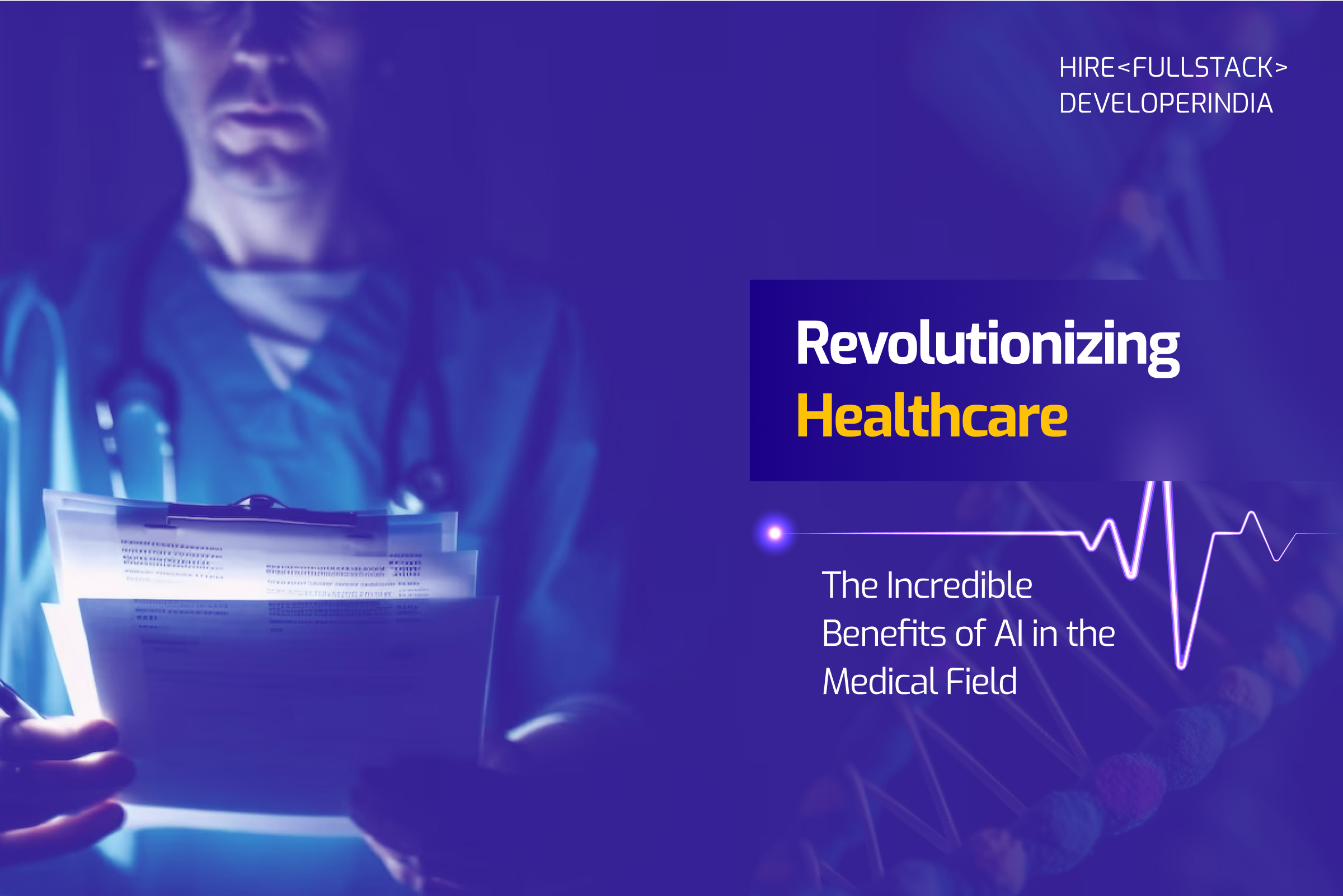The healthcare industry is witnessing a remarkable transformation with the advent of Artificial Intelligence (AI). With the AI in healthcare market valued at $8.23 billion in 2020, its growth is projected to skyrocket, reaching a staggering $194.4 billion by 2030. This exponential growth, with a compound annual growth rate (CAGR) of 38.1% from 2021 to 2030, highlights the immense potential and transformative impact of AI in revolutionizing healthcare practices. As we explore the remarkable advancements and benefits of AI in the medical field, we witness the dawn of a new era in healthcare delivery and patient care.
AI has become a driving force behind groundbreaking advancements in clinical operations, drug development, surgery, and data management. Its application in hospitals is expanding rapidly, changing the way healthcare professionals deliver care and patients experience treatment. Hire AI developers or partner with an AI development company that specializes in healthcare. They possess the expertise and skills to create innovative AI solutions tailored to your specific needs.
In this blog, we will explore the incredible benefits of AI in the medical field. From enhanced diagnostics and personalized treatment to drug discovery and remote patient monitoring, AI is transforming healthcare in unprecedented ways.
1. What is Artificial Intelligence (AI) in healthcare?
AI in healthcare refers to the application of Artificial Intelligence technologies and techniques in the field of healthcare to improve patient care, diagnosis, treatment, and overall healthcare management. It involves the use of machine learning algorithms, natural language processing, data analytics, and other AI-based tools to analyze medical data, make predictions, assist in decision-making, and automate various healthcare processes.
AI in healthcare has the potential to revolutionize the industry by enhancing efficiency, accuracy, and productivity, enabling personalized medicine, facilitating early detection of diseases, and improving patient outcomes. It encompasses a wide range of applications, including medical imaging analysis, drug discovery, virtual assistants, robotic surgery, patient monitoring, and healthcare data management.
2. Benefits of Artificial Intelligence in Healthcare

- Improved Diagnosis: AI algorithms can analyze medical images, lab results, and patient data to assist in accurate and timely diagnosis. For example, AI-powered image recognition can help detect early signs of diseases like cancer from medical scans.
- Personalized Treatment Plans: AI can analyze vast amounts of patient data to create tailored treatment plans based on individual characteristics and medical history. This can optimize treatment outcomes and minimize side effects. For instance, AI algorithms can analyze genetic information to guide personalized cancer treatments.
- Predictive Analytics: AI models can analyze patient data and identify patterns to predict the likelihood of disease progression or adverse events. This allows healthcare providers to intervene early and provide proactive care. For example, AI can predict the risk of readmission for heart failure patients.
- Remote Monitoring: AI-powered devices and wearables can monitor patient health remotely and alert healthcare professionals in case of any abnormalities. For instance, AI-enabled smartwatches can track heart rate, sleep patterns, and activity levels to monitor overall well-being.
- Drug Discovery and Development: AI algorithms can analyze vast databases and scientific literature to identify potential drug candidates and accelerate the drug discovery process. For example, AI can help in identifying new drug targets for complex diseases like Alzheimer’s.
- Precision Medicine: AI can analyze genetic and molecular data to identify specific biomarkers and genetic variations that influence disease susceptibility and treatment response. This enables the development of personalized therapies. For instance, AI can identify genetic markers that indicate a higher risk of developing certain diseases.
- Efficient Administrative Tasks: AI-powered systems can automate administrative tasks such as scheduling appointments, managing electronic health records, and billing processes. This frees up healthcare professionals’ time to focus more on patient care.
- Virtual Assistants and Chatbots: AI-powered virtual assistants and chatbots can provide patients with instant access to healthcare information, symptom assessment, and guidance. These AI-based systems can offer personalized recommendations and answer common medical queries.
- Surgical Assistance: AI-powered surgical robots can assist surgeons during complex procedures, enhancing precision, minimizing invasiveness, and reducing risks. For example, robots can assist in minimally invasive surgeries such as laparoscopy.
- Data Security and Privacy: AI algorithms can help safeguard patient data by detecting and preventing security breaches. AI can identify patterns of unauthorized access and anomalous behavior, ensuring data privacy and compliance with regulations.
3. Real-World Examples and Use Cases of AI in Healthcare

AI in healthcare has revolutionized the way medical professionals diagnose, treat, and manage diseases, transforming the entire healthcare ecosystem. Here are some compelling real-world examples and use cases of AI in healthcare:
Personalized Medicine: AI algorithms can analyze a patient’s genetic information, medical history, and lifestyle factors to develop personalized treatment plans. This enables doctors to deliver targeted therapies and interventions, improving patient outcomes and minimizing side effects.
Remote Patient Monitoring: AI-powered wearable devices and sensors can continuously monitor vital signs, such as heart rate, blood pressure, and glucose levels. This real-time data is transmitted to healthcare providers, allowing them to remotely monitor patients, detect anomalies, and intervene when necessary.
Early Disease Detection: AI algorithms can analyze medical imaging data, such as mammograms and pathology slides, to identify early signs of diseases like cancer. Early detection enables prompt intervention, leading to higher survival rates and better patient outcomes.
Virtual Nurses: AI-powered virtual nurses or chatbots can provide patients with round-the-clock support, answering questions, providing medication reminders, and offering guidance on managing chronic conditions. These virtual assistants enhance patient engagement, improve adherence to treatment plans, and alleviate the burden on healthcare providers.
Predictive Analytics for Hospital Management: AI algorithms can analyze historical patient data, resource utilization, and operational patterns to forecast patient inflow, optimize bed allocation, and predict staffing needs. This enables hospitals to improve efficiency, streamline operations, and enhance patient flow.
Drug Adverse Event Monitoring: AI algorithms can analyze vast amounts of patient data, electronic health records, and adverse event reports to detect patterns and identify potential adverse reactions to medications. This proactive monitoring system helps ensure patient safety and enables swift intervention when adverse events occur.
Mental Health Support: AI-powered chatbots and virtual therapists can provide mental health support, offer counseling services, and assist in managing stress, anxiety, and depression. These digital tools help bridge the gap in access to mental health services and provide support to a larger population.
Robotic Surgery: AI-powered surgical robots enable precise and minimally invasive procedures. These robots can assist surgeons by providing enhanced visualization, improved dexterity, and real-time feedback during surgeries. AI algorithms analyze patient data and assist in guiding surgical instruments, leading to more accurate and efficient procedures with reduced risks.
Disease Outbreak Prediction: AI models can analyze vast amounts of data from sources such as social media, news reports, and public health records to predict and monitor disease outbreaks. By identifying patterns and correlations, AI algorithms can provide early warnings and help public health officials allocate resources, implement preventive measures, and manage public health emergencies more effectively.
Health Data Security: AI technologies are being employed to strengthen data security and protect patient information. AI algorithms can detect and prevent potential data breaches, identify anomalies in user behavior, and enhance data encryption protocols, ensuring the confidentiality and integrity of healthcare data.
These examples showcase the incredible potential of AI in healthcare, transforming patient care, improving efficiency, and driving innovation in the industry. As AI continues to advance, we can expect even more groundbreaking applications that will further revolutionize the way we approach healthcare.
4. Some Examples of AI Tools used in the Healthcare Industry

- IBM Watson: IBM Watson is an AI-powered system that can analyze vast amounts of medical literature, patient data, and clinical guidelines to assist doctors in making evidence-based treatment decisions. It can provide insights and recommendations based on the latest research and help improve diagnostic accuracy.
- Chatbots: AI-powered chatbots are being used in healthcare to provide instant responses and support to patients. They can answer common medical questions, provide guidance on symptoms, and direct patients to appropriate resources or healthcare providers.
- Computer-Aided Diagnosis (CAD): CAD systems use AI algorithms to analyze medical images such as X-rays, CT scans, and MRIs. These tools help radiologists detect abnormalities, assist in early disease detection, and improve the accuracy of diagnoses.
- Robot-Assisted Surgery: AI-powered robotic systems, such as the da Vinci Surgical System, assist surgeons during complex procedures. These robots enhance precision, flexibility, and control, enabling minimally invasive surgeries and improving patient outcomes.
- Virtual Nursing Assistants: Virtual nursing assistants, powered by AI, provide support and guidance to patients outside of clinical settings. They can remind patients to take medication, provide health monitoring instructions, and answer questions about post-treatment care.
- Predictive Analytics: AI-based predictive analytics tools analyze large volumes of patient data to identify patterns and trends. These tools can help predict disease progression, identify high-risk patients, and enable proactive interventions for better disease management.
- Wearable Devices: Wearable devices, such as fitness trackers and smartwatches, use AI algorithms to monitor vital signs, track physical activity, and provide real-time health insights. These devices help individuals monitor their health, track fitness goals, and identify potential health issues.
- Natural Language Processing (NLP): NLP technology allows AI systems to understand and interpret human language. In healthcare, NLP is used to extract valuable information from medical records, transcribe doctor-patient conversations, and enable voice-based interactions with healthcare applications.
- Remote Patient Monitoring: AI-based remote patient monitoring systems use sensors and data analytics to track patients’ health remotely. These systems can detect anomalies, monitor vital signs, and provide alerts to healthcare providers in case of emergencies or changes in health status.
- Drug Discovery: AI is being used to accelerate the drug discovery process by analyzing large datasets and identifying potential drug candidates. AI algorithms can help predict the effectiveness and safety of new drugs, reducing the time and cost involved in the development process.
- These examples illustrate the remarkable impact of AI in the healthcare industry, where organizations are harnessing its power to elevate patient care, advance diagnostic capabilities, and optimize healthcare operations. Hire AI developers to leverage the transformative capabilities of AI and stay at the forefront of the evolving healthcare landscape.
5. Challenges of AI in Healthcare

While AI offers tremendous potential in healthcare, it also presents some challenges that need to be addressed. Here are some key challenges of AI in healthcare:
- Data Quality and Privacy: AI algorithms require large amounts of high-quality data to train and make accurate predictions. Ensuring data accuracy, privacy, and security while maintaining patient confidentiality is a significant challenge.
- Ethical Considerations: AI algorithms and models need to be developed and deployed with ethical considerations in mind. This includes issues such as bias in algorithms, transparency, accountability, and the potential impact on patient autonomy and decision-making.
- Regulatory Compliance: Healthcare is a highly regulated industry, and incorporating AI into clinical practice requires adherence to regulatory standards and compliance with laws regarding data privacy, patient consent, and medical device regulations.
- Integration with Existing Systems: Integrating AI technologies with existing healthcare systems and workflows can be complex and challenging. Compatibility issues, interoperability, and seamless integration with electronic health records (EHR) and other systems need to be addressed.
- Trust and Acceptance: Building trust in AI systems among healthcare professionals and patients is crucial. Ensuring transparency, explaining the decision-making process of AI algorithms, and addressing concerns about job displacement are important for widespread acceptance and adoption.
- Skill Gap and Training: Healthcare professionals need to acquire the necessary skills to effectively use AI technologies. Training programs and educational initiatives are required to bridge the skill gap and equip healthcare professionals with the knowledge and expertise to leverage AI tools.
- Cost and Resource Constraints: Implementing AI technologies can be costly, requiring investments in infrastructure, data storage, computational resources, and specialized expertise. Limited resources in healthcare settings can pose challenges for widespread adoption.
6. Future of AI in the Healthcare Industry
The future prospects of AI in the healthcare industry are promising and hold immense potential for revolutionizing patient care. Augmented decision-making powered by AI algorithms can provide healthcare professionals with comprehensive insights and personalized treatment options, leading to improved outcomes.
Remote patient monitoring using AI-enabled devices enables proactive and remote patient management, particularly for individuals with chronic conditions. Early disease detection through AI analysis of patient data can aid in timely intervention and better prognosis. AI also plays a crucial role in ensuring data security and privacy compliance, with measures like HIPAA regulations.
Enhanced patient engagement, precision imaging, drug safety monitoring, workflow optimization, predictive analytics, and ethical considerations further contribute to the positive impact of AI in healthcare. Embracing these advancements will enable the industry to provide more efficient, personalized, and effective care to patients.
7. Conclusion
In sum, the impact of AI in the medical field is truly remarkable. It is revolutionizing healthcare by bringing numerous benefits and transforming the way medical services are delivered. From improved diagnosis accuracy to personalized treatment plans and streamlined operations, AI is enhancing patient care, saving lives, and reducing costs.
However, it is important to address potential risks and ethical concerns associated with AI, such as data privacy, bias, and the need for human oversight. By navigating these challenges responsibly and ethically, we can harness the incredible potential of AI in healthcare and create a future where patients receive the best possible care with the support of advanced technology.


